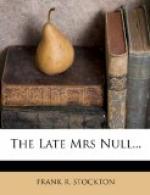“Did you see that in the Richmond Dispatch or in one of the New York papers?” interrupted Miss March.
“That is a point,” said Lawrence, overlooking the ridicule, “which we need not discuss. I am perfectly aware that Mr Keswick is my rival, but I wish you to understand that I am not voluntarily taking any undue advantage of his absence. I believe him to be a very fair and generous man, and I would wish to be as open and generous as he is. When I came, I expected to find him here, and, standing on equal ground with him, I intended to ask you to accept my love.”
“Well, then,” said Roberta, “would it not be more fair and generous for you to go away now, and postpone this proposal until some time when you would each have an equal chance?”
“No, it would not,” said Lawrence, vehemently. “I have now an opportunity of telling you that I love you ardently, passionately; and nothing shall cause me to postpone it. Will you not consider what I say? Will you make no answer to this declaration of most true and honest love?”
“I am considering what you have said,” she answered; “and I am very glad to hear that you did not know of this cunning little trap that Mrs Keswick has laid for me. It is all very plain to me, but I do not know why she should have selected you as one of the actors in the plot. Have you ever told her that you are a suitor for my hand?”
“Never!” exclaimed Lawrence. “She may have imagined it, for she heard I was a frequent visitor to Midbranch. But let us set all that aside. I am on fire with love for you. Will you tell me that you can return that love, or that I must give up all hope? This is the most important question of my whole life. I beg you, from the bottom of my heart, to decide it.”
“Mr Croft,” said she, “when you used to come, nearly every day, to see me at Midbranch, and we took those long walks in the woods, you never talked in this way. I considered you as a gentleman whose prudence and good sense would not allow him to step outside of the path of perfectly conventional social intercourse. This is not conventional and not prudent.”
“I loved you then, and I love you now;” exclaimed Lawrence. “You must have known that I loved you, for my declaration does not in the least surprise you.”
“Once—it was the last time you visited Midbranch—I suspected, just a little, that your mind might be affected somewhat in the way you speak of, but I supposed that attack of weakness had passed away.”
“I know what you mean,” said Lawrence, “but I can’t endure to talk of such trifles. I love you, Roberta—”
“Miss March,” she interrupted.
“And I want you to tell me if you love me in return.”
Miss March rose from the rock where she had been sitting, and her companion rose with her. After a moment’s silence, during which he watched her with intense eagerness, she said: “Mr Croft, I am going to give you your choice. Would you prefer being refused under a cherry tree, or under a sycamore?”




